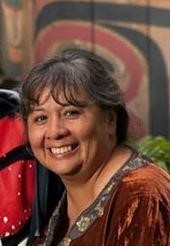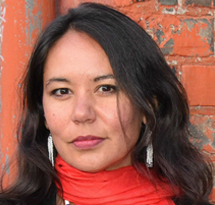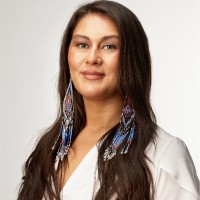Yappalli: Restoring Hope and Resilience to Narratives of Trauma
Yappalli: Choctaw Road to Health was an NIH-funded (R01DA037176 4/2014-5/2022; PI Walters; MPI Johnson-Jennings) randomized controlled trial collaboratively designed and led by Dr. Karina Walters (enrolled member of Choctaw Nation of Oklahoma and former tenured professor at University of Washington prior to joining NIH as the Director of the Tribal Health Research Office) and Dr. Michelle Johnson-Jennings (enrolled member of Choctaw Nation of Oklahoma and professor at University of Washington) in which Choctaw women re-walked the Trail of Tears and considered what kind of ancestor their ancestors who had made the original walk, envisioned them to be. “Our nation has always had memorial walks,” said Dr. Michelle Johnson-Jennings, one of the principal investigators of the project. “We re-walk these to remember the lessons learned and what we could do to be healthier. Through Yappalli, we’re restoring hope and resilience to narratives of trauma.”

Sandra Stroud
Sandra Stroud, the project director, noted that Yappalli began with concerns about health disparities, particularly for children in the community. Although health facilities and resources in the Choctaw Nation were strong, the “heart piece” was missing. “We decided we wanted to try taking people on the Trail of Tears, not to experience the trauma [their ancestors] experienced but to experience their strength and their love, and the hopes and dreams they must have held on to,” said Ms. Stroud. “When you’ve lost connection to everything that helps you be human, what do you hold on to? What remains to help you be physically, mentally, and emotionally strong enough to survive that kind of trauma.” Jessie Roberts, one of the participants, pointed out that the story of the Trail of Tears is a story of women protecting their families and communities. “Our mothers, our grandmothers, our great-grandmothers, our aunties—they had to wade through water, and they wouldn’t leave their children behind. It let me know they were carrying me, and I had to keep going.”
Although the Yappalli intervention was funded to address substance misuse and obesity prevention, they did so through a broad and holistic Choctaw health approach and by centering their efforts on building Choctaw women community health leaders. The curriculum integrated Choctaw health-related ancient teachings (i.e., original instructions) and stories; and, focused on growing relational ways of being to ancestors, the natural world, food/water, and to their own bodies, families and community. Additionally, the curriculum encouraged re-storying their personal journey to health (i.e., narrative transformation) by identifying the strengths of their Choctaw ancestors who survived the Trail of Tears and recommitting to the ancestral love and vision that they carried and that the women, in turn, carry through their behavioral health actions for future Choctaw generations.
Dr. Johnson-Jennings highlighted that many interventions recruit participants by focusing on a health condition they have, but Yappalli asked women to do something positive for their community by learning about health and sharing it with others. Ms. Roberts noted that building connections is an important part of learning how to be part of the community and learning how to live well. “We make sure our elders were taken care of, but we take care of our youth, as well. It connects your heart, soul, and brain, and it teaches you a lesson that never ends.” Ms. Stroud emphasized the importance of “recognizing what your strength is and recognizing the strength of their ancestors, then asking what we are doing with our health and what we are sending for the health of others yet to be born.” She added that her own strength she developed on the walk is strength that she can share. “If I take care of myself, I’m not pulling from somebody else’s strength, but I can give to the community. If you don’t take care of yourself, what are you doing for all of us?”

Dr. Michelle Johnson-Jennings
In addition to walking for physical and mental health, Yappalli also returned participants to the original Choctaw ways of connecting with the earth and living in a culturally based healthy way. “Our ancestors were great scientists, and we have all these stories to instruct us about where to go and what to do,” said Dr. Johnson-Jennings. “When you go outside, other types of knowledge are awakened, and we are more open to and aware of these other ways of knowing.” Ms. Stroud pointed out that developing healthy meals for the walk was a challenge, and some participants needed reminders about the availability of healthy food, but “people get what they put into it sometimes, and you have to meet them where they’re at,” and noted, “One participant tried grilled vegetables for the first time, then convinced her husband to grow them and learned from us how to grill them. By the end of that time together, she was bringing vegetables from her garden to us.”
The women who participated in Yappalli were able to grow healthfully both within their community and within their own lives. Being surrounded by other women, said Ms. Roberts, “changed my outlook on life and on relationships, because we created a safe place for each other, and we began to look out for each other, learn to love each other, and accept each other. We shared every piece of our day with each other, and at the end, we missed each other like we have been connected our whole life.” Ms. Stroud added that people know when they’ve met a Yappalli woman. “They’re different—the women that shared that experience share something really deep.”
As part of the study, participants followed a Choctaw-based health curriculum (i.e., nutrition, physical activity, substance abuse prevention, and community leadership development) before the walk and then created a community health promotion event after the walk. “We’ve seen some great changes take place in communities. We’ve seen walking groups start in rural places where you never dreamed they would occur, community gardens, talks given in the community, people serving healthy food,” said Dr. Johnson-Jennings. Participants were asked to develop a hometown project, which helped them act as health leaders and expand what they learned to their communities. Some of the walking clubs that participants started became community gathering events that continue to this day. “They developed a family around the trail, and that made you want to go to their walks—not because of your personal health but because you didn’t want to miss the stories,” said Ms. Stroud. “When you drove up, you would hear the laughter coming from across the way as they were walking around us.”

Jessie Roberts
Those who have walked continue to teach the Yappalli lessons to their children and families. “You know what I did when I got back home?” asked Ms. Roberts. “I took my family back, and we walked it together. We told the stories, and now we will ask each other what our ancestors would have thought or felt. All these years later, it’s still a part of everything we do.” People around the world now have contacted Dr. Johnson-Jennings about designing interventions like Yappalli for their own communities, and projects for young people are in development. “A lot of the youth think that older generations have ruined the earth, and they feel hopeless. When we start doing things collectively to help Mother Earth, we really start seeing a change in attitude and a belief that things can occur if we work together, which has been really valuable for individual coping, mental health, and well-being.”
“If we’re collectively moving toward health, that’s when we can achieve true wellness within the community and health within individuals, because we’re interconnected,” said Ms. Stroud. “That’s what Yappalli did for so many—it gave them a sense of connectedness that we don’t always feel now. Yappalli was about how we connect to the love of our ancestors. They dreamed a better time for us, and we’re the response of those dreams.”